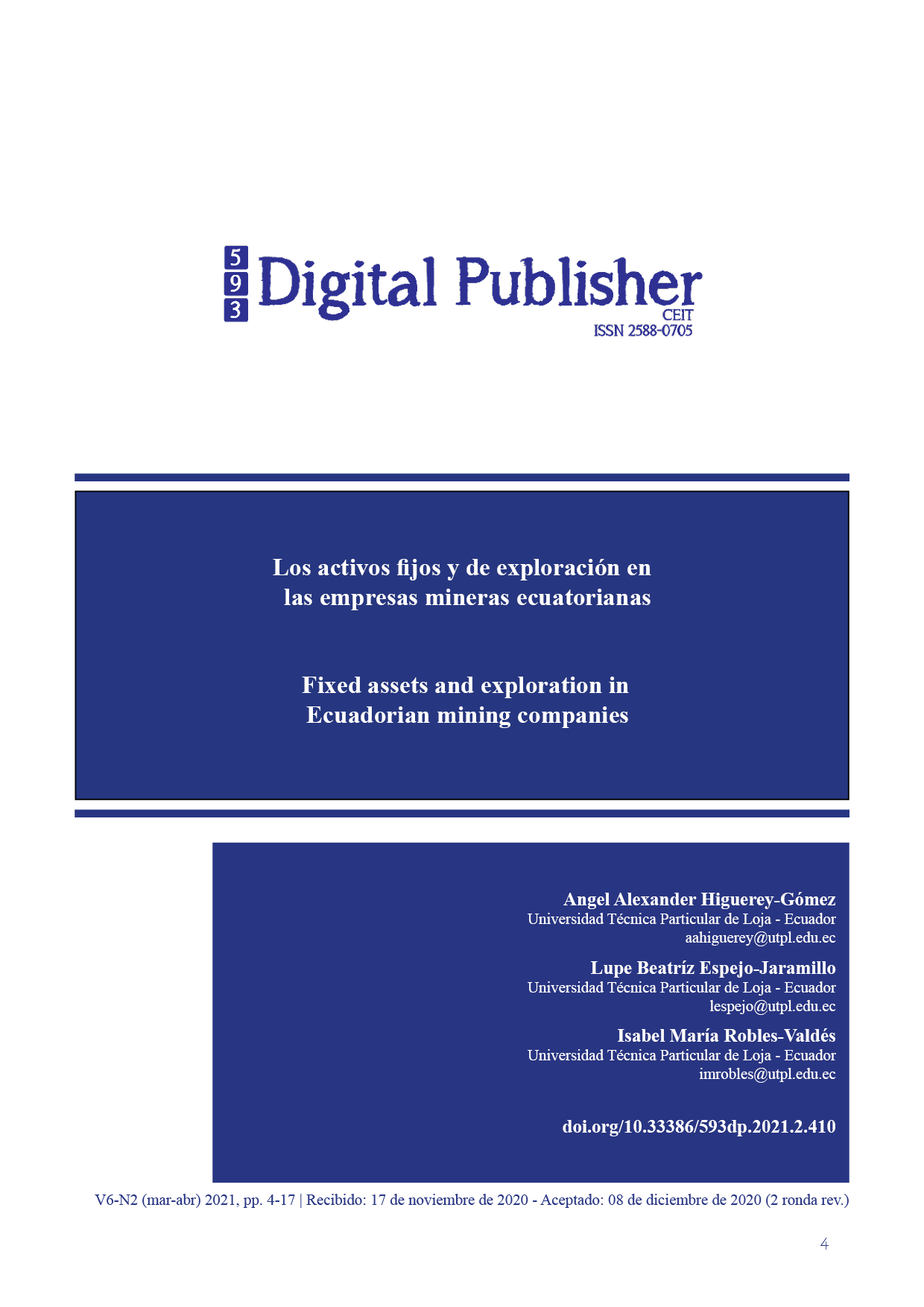Fixed assets and exploration in Ecuadorian mining companies
Main Article Content
Abstract
The mining sector, from an accounting point of view, must apply the International Fi-nancial Reporting Standards (IFRS) specifically IAS 16 Property, plant and equipment and IFRS 6 Exploration and evaluation of mineral resources. The first standard deals with the recording of the assets of the company that it uses in its main activity, while the second seeks to specify the assets for exploration and evaluation, while incorporat-ing the impairment account. This paper seeks to describe the use of IAS 16 and IFRS 6 by extraction companies in Ecuador, to evaluate and compare the profitability of com-panies that have incorporated the asset accounts for exploration and evaluation with those that have not. have made. The base of the Superintendecia de Compañías, Se-guro y Valores of Ecuador had 1,918 observations of extractive companies, micro-companies were eliminated and those that meet the characteristic of being extraction companies were selected and have information in the financial statements since 2014 until 2018. A balanced panel was prepared for the years 2014 to 2018 with 525 obser-vations from 105 companies. Descriptive statistics are used as a methodology to make a description of the mining companies, while inferential statistics are used to assess profitability, specifically the non-parametric Kruskal Wallis H test. The results show that the majority of companies have used the exploration intangible assets account, but there is no relationship between it and their valuation account. On the other hand, there is no difference in terms of profitability, between companies that use IFRS 6 and those that do not.
Downloads
Article Details

This work is licensed under a Creative Commons Attribution-NonCommercial-ShareAlike 4.0 International License.
1. Derechos de autor
Las obras que se publican en 593 Digital Publisher CEIT están sujetas a los siguientes términos:
1.1. 593 Digital Publisher CEIT, conserva los derechos patrimoniales (copyright) de las obras publicadas, favorece y permite la reutilización de las mismas bajo la licencia Licencia Creative Commons 4.0 de Reconocimiento-NoComercial-CompartirIgual 4.0, por lo cual se pueden copiar, usar, difundir, transmitir y exponer públicamente, siempre que:
1.1.a. Se cite la autoría y fuente original de su publicación (revista, editorial, URL).
1.1.b. No se usen para fines comerciales u onerosos.
1.1.c. Se mencione la existencia y especificaciones de esta licencia de uso.
References
Abdo, H. (2016). Accounting for Extractive Industries: Has IFRS 6 Harmonised Accounting Practices by Extractive Industries? Australian Accounting Review Vol: 26 num 4, pp. 346-359.
Bebbington, A. (2011). Minería, movimientos sociales y respuestas campesinas. Una ecología política de transformaciones territoriales. Lima: IEP– CEPES.
Bernal Torres, C. A. (2016). Metodología de la investigación: administración, economía, humanidades y ciencias sociales. Bogotá: Pearson.
Cabrera, M.; Espitia, J.; Fierro, J.; Negrete, R.; Pardo, L.; Rudas, G.; Vargas, F. (2013). Minería en Colombia, Fundamentos para superar el modelo extractivista. Contraloría General de la República. Colombia: Imprenta Nacional.
Chamba-Rueda, L. M.; Higuerey, A.; Pardo-Cueva, M. & Rios-Zaruma, J. (2018). Quality factors and their impact on the business performance in the ecuadorian manufacturing sector Loja. In 2018 13th Iberian Conference on Information Systems and Technologies (CISTI) (pp. 1-6). IEEE.
Composto, C. Navarro, L. (2019). Estados, transnacionales extractivas y comunidades movilizadas: dominación y resistencias en torno de la minería a gran escala en América Latina. Theomai [en linea]. 2012, (25), 58-78[fecha de Consulta 15 de Noviembre de 2019]. ISSN: 1666-2830. Disponible en: https://www.redalyc.org/articulo.oa?id=12426062007
Damonte, G. (2012). Dinámicas rentistas: transformaciones institucionales en contextos de proyectos de gran minería. Desarrollo rural y recursos naturales (pp. 95-122). Lima: GRADE Group for the Analysis of Development. https://nbn-resolving.org/urn:nbn:de:0168-ssor-51782-8
Díaz. O. (2010). Estado actual de la aplicación de las NIIF en la preparación de estados financieros de las empresas peruanas. Contabilidad y Negocios, Revista del Departamento Académico de Ciencias Administrativas volumen 5, número 10 noviembre 2010
Español, S. (2012). Contaminación con mercurio por la actividad minera. Biomédica Instituto Nacional de Salud Volumen 32, No. 3, Bogotá, D.C., Colombia - septiembre, 2012
Espejo L. y López G. (2018). Contabilidad General. Enfoque con Normas Internacionales de Información Financiera (NIIF). Loja: Universidad Técnica Particular de Loja.
Hernández, R., Fernández, C., & Baptista, P. (2014). Metodología de la investigación México: Mc Graw Hill.
Higuerey, Á.; Espejo, L. y Robles, I. (2019). Aplicación de la NIIF 6 en el contexto ecuatoriano. Revista Inclusiones Vol: 6 núm Especial: 239-258
Ibrahim, Q.; Rehman, R. y Raoof, A. (2010). “Role of corporate governance in firm performance: a comparative study between chemical and pharmaceutical sectors of Pakistan”. International Research Journal of Finance and Economics, Vol: 50 (2010): 7-16.
IFRS (2006). Norma Internacional de Información Financiera 6 Exploración y evaluación de recursos naturales. Londres: IASB.
IFRS (2009). Norma Internacional de Información Financiera para Pequeñas y Medianas Entidades (NIIF para las PYMES). Londres: IASB.
IFRS (2014). Norma Internacional de Contabilidad 16 Propiedades, Planta y Equipo. Londres: IASB.
Ladislao, G. (2015). La gestión de responsabilidad social empresarial de las empresas mineras en el Perú y su incidencia en el desarrollo sostenible de las comunidades de su entorno - período 2004 - 2014 tesis de grado de Dr. en Contabilidad y Finanzas. Universidad San Martín de Porres, Perú.
Mora, J., Martínez, O., Pardo, M., Cantillo, J. (2015). Crisis de la representación contable en la industria petrolera: ensamblando hetoroglosias de poder hacia el acto ético. Revista Científica General José María Córdova
Orellana, C. (2016). Deterioro del valor de los activos mineros, según las Normas Internacionales de Contabilidad y la gestión de resultados: Evidencia para las empresas mineras chilenas. Capic Review Vol. 14 (2): 83-91, 2016
Power, S., Cleary, P., Donnelly, R. (2017). Accounting in the London Stock Exchange´s extractive industry: The effect of policy diversity on the value relevance of exploration-related disclosures. The British Accounting Review 49:545 – 559.
Rea, A. (2017). Política minera y sostenibilidad ambiental en Ecuador. FIGEMPA: Investigación Y Desarrollo, 1(2), 41-52. https://doi.org/10.29166/revfig.v1i2.68
Sánchez, L. Vázquez, L. Verdú, A. (2017). Minería a gran escala en Ecuador: Conflicto, resistencia y etnicidad AIBR Revista de Antropología Iberoamericana www.aibr.org Volumen 12 Número 2 Mayo - Agosto 2017 pp. 169 – 192
Villamil, J. (2012). Consolidación de la gran minería transnacional en Latinoamérica. Theomai, núm. 25, 2012, pp. 46-57 Red Internacional de Estudios sobre Sociedad, Naturaleza y Desarrollo Buenos Aires, Argentina.




